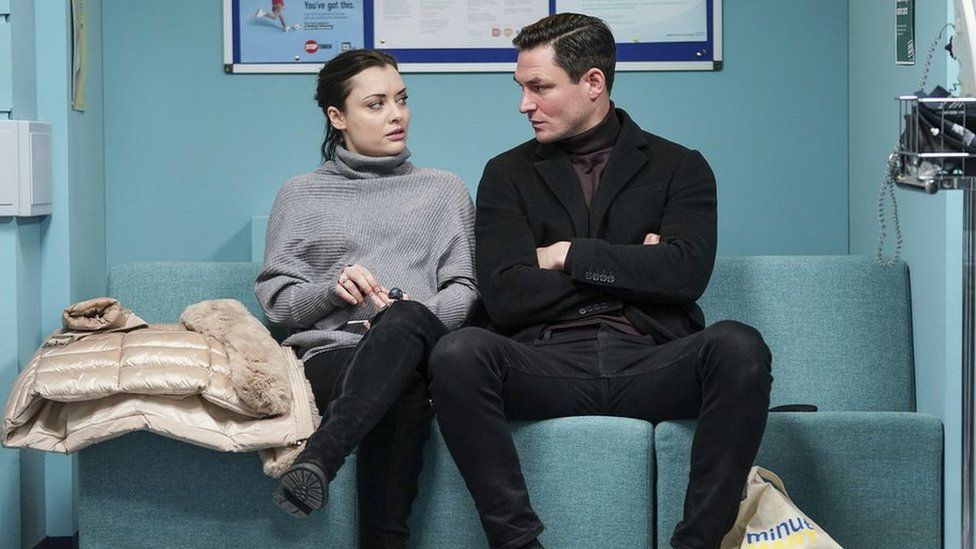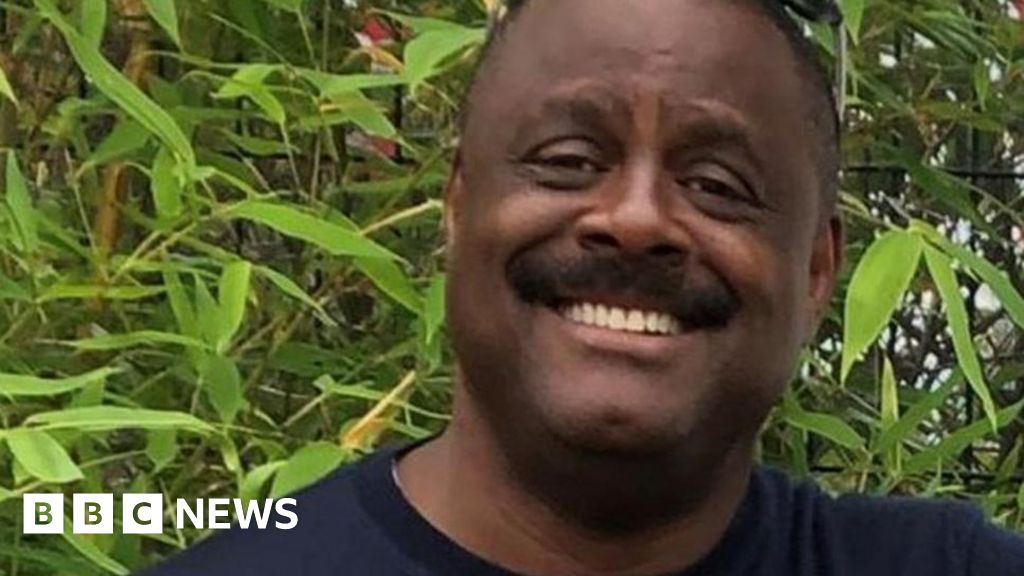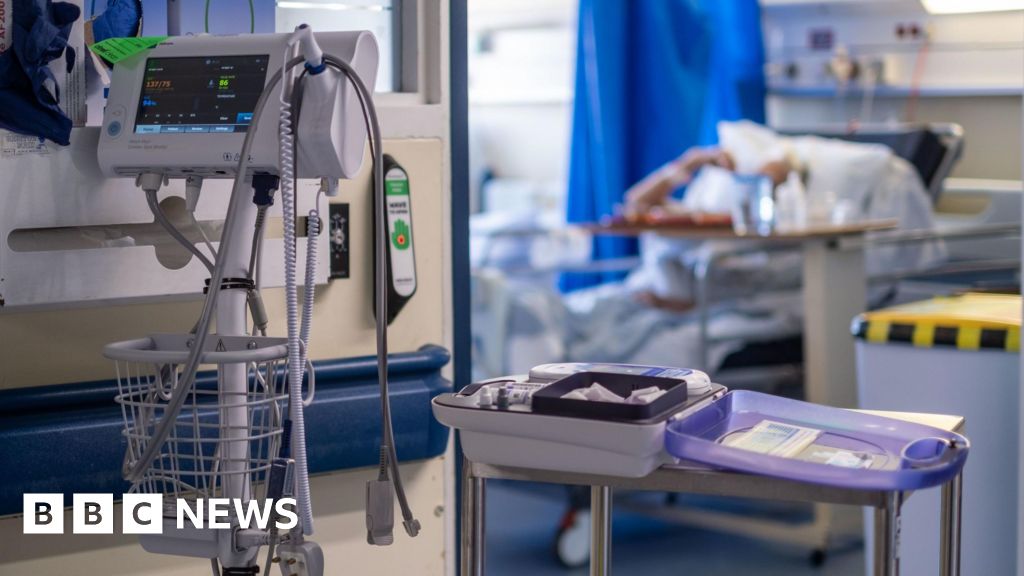ARTICLE AD BOX

By Manish Pandey
Newsbeat reporter
"You picture your life with this baby and then all of a sudden it's taken away from you."
It's been almost a year since Rebecca Spence lost her baby due to a rare, serious condition called Edwards' syndrome, or trisomy 18.
Most babies diagnosed with it will sadly die before or just after being born.
Rebecca says it leaves parents with a decision - carry on, knowing the child might not survive, or end the pregnancy.
"You have choices to make and none of them are choices you want to make," she says.
The heart-breaking dilemma has been played out in EastEnders over the past month.
Characters Whitney Dean and Zack Hudson learned their baby, Peach, had Edwards' syndrome.
Like Rebecca, the couple opted for a termination after being told it would limit the baby's lifespan.
Many other viewers said the emotional scenes reflected their own experiences, and praised actors Shona McGarty and James Farrar for their performances.
'Feels like a blur'
In Rebecca's case, her 12-week pregnancy scan found no problems, but a later check showed multiple abnormalities.
She describes a feeling of "shock, disbelief and then going into a state of fight or flight" after the diagnosis of Edwards' syndrome.
"I was in denial for a while," she says, "Hard to remember exactly how I was feeling."
Levi, 28 from Stoke, was 20 weeks pregnant when problems were found and her baby was diagnosed with Edwards' syndrome.
That moment was "crazy, like the world stops," she says.
"It's like a lightning strike… like the world's just come crashing down."
Levi and her partner eventually made the decision to go ahead with a termination.
She says it was the most challenging moment of her experience, especially seeing other people with healthy babies having scans at the same time.
Levi says she's grateful for the two children she'd already had, "because they've given us something to focus on".
Image source, Levi
Image caption,Levi, pictured with her partner Jak, hopes the Eastenders storyline will help to educate people about trisomy 18
Both Levi and Rebecca say they were glad EastEnders chose to run the storyline.
"There should be more awareness out there," says Levi.
Rebecca, who's now 29, was pleased the show also focused on Whitney and Zack's grief after losing Peach.
"It's coming up to the year anniversary. And it still feels raw, even now," she tells BBC Newsbeat.
"I think pregnancy loss and baby loss is still a huge taboo, and not really spoken about very often.
"Because when you think about our baby dying, it feels wrong. It doesn't feel like the circle of life.
"I'm sure there's so many people out there going through things. So hopefully it'll make them feel less alone as well."
What is Edwards' syndrome?
- Also known as trisomy 18, it's rare but serious
- Most babies with the condition will die before or shortly after being born
- A small number (about 13 in 100) babies born alive with Edwards' syndrome will live past their first birthday
- All babies born with Edwards' syndrome will have some level of learning disability. The severity can vary
- Your chance of having a baby with Edwards' syndrome increases as you get older, but anyone can have a baby with Edwards' syndrome
- It does not usually run in families and is not caused by anything the parents have or have not done
- A baby with Edwards' syndrome has three copies of chromosome number 18 instead of 2. This affects the way the baby grows and develops.
- Having three copies of chromosome 18 usually happens by chance, because of a change in the sperm or egg before a baby is conceived.
- There's no cure for Edwards' syndrome, and treatment will focus on the symptoms of the condition, such as heart conditions, breathing difficulties and infections
Not everyone has the same experience.
The NHS says about 13% of babies with Edwards' syndrome who are born alive live past their first birthday.
Amber-Rose, now aged five, is one of them.
Mum Jennifer Holyrod tells Newsbeat she was 32 weeks pregnant when she found out Amber was "not growing the way she should have been".
A diagnosis would not have been possible at this late stage, so, after much thought, Jennifer and her partner decided to wait.
"I think not knowing at that time, it was just praying to get to the end of your pregnancy and that everything is going to be OK," she says.
Amber was born by Caesarean section, weighing just 4lb (1.8kg) and with breathing difficulties.
These improved once she was treated in the neonatal department, which provides specialist care for poorly newborns, and after two weeks Amber was diagnosed with Edwards' Syndrome.
Image source, Jennifer Holyrod
Image caption,It's been a rocky road, but Jennifer says Amber is doing much better
Jennifer says it felt "as though Amber was written off", and there was an expectation she would not survive long-term.
She says the next six months of medical interventions were "trauma, for her and for us as a family".
"What she went through in those few months isn't something that any child should have to go through, or any parent should have to see."
But Amber grew, became stronger and "kept being able to fight those fights", Jennifer says.
Now Amber, who started school in September, is "a happy little girl".
There are challenges, Jennifer says, with disabilities and Amber being unable to walk or talk.
"She laughs and plays... she does communicate in her own way. She's smiling all the time and her interaction with people is something else."
Image source, Jennifer Holyrod
Image caption,Amber started school in September
Jennifer says she was keen to share her story to show "there are positive outcomes" that can take place.
"When we were at the start, all we wanted was to look for those positive stories.
"It's hard to get through every day without that little bit of hope. So it hopefully gives somebody else that little bit of hope."
SOFT UK, a specialist support charity for those affected by Edwards' syndrome, helped EastEnders' writers to shape the storyline.
In a statement, it said: "Although the EastEnders plot is not representative of everyone's story, it does capture the experience many families will face, and the heart-breaking decisions laid out before them."
If you've been affected by the issues raised in this article, advice can be found via BBC Action Line.

 2 years ago
123
2 years ago
123








 English (US) ·
English (US) ·